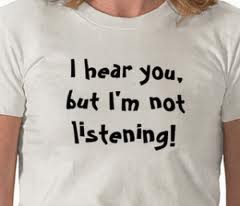“I hear you but I am not listening” is a quote we can attribute to many facets of life but not when it comes to our health.

The science of rest tells us that there are both physical and mental signs that indicate you need a rest day so it is very important to recognize the signs when your body is telling you it needs a break. Check out what Laura Henshaw says about How I Learnt to Listen to My Body.
Learning to hear what your body is telling you helps us understand what is going on inside our bodies and puts us in a much better position to head off a looming health crisis before it even gets started.
Unfortunately, in today’s gadget orientated world, fitness trackers reveal the damaging pitfalls of the modern approach to self-improvement; fitness wearables can track all sorts of bodily information which, although useful, can often put greater pressure on the wearer to work or train at levels well above comfortable and safe limits.
That’s why learning to listen and understand what your body is trying to tell you is more important than relying on the latest tracking device.
No one wants to put up with months of ongoing injuries that could be very easily prevented.
Here are the 4 tips to get you started:
1. Watch the Scales
You can listen to your body every time you put on your clothes or when stepping on the bathroom scales.
Do your clothes feel comfortable and how is the fit? Are they becoming too loose or conversely are they too snug? That is telling you something straight away.
Is the scale tipping one way or another in the wrong direction? If you find you are losing too much weight or packing on the kilos, it can be a sign you are being affected by stress and are not eating in ways which promote good health.
By looking at the Mayo Clinic Healthy Weight Pyramid it tells us good health comes from eating a balanced diet of fruits, vegetables, whole grains, protein and dairy, fish and lean meats.
This means we need to drastically cut back on empty foods like biscuits, cakes, doughnuts processed meals, soft drinks and alcoholic beverages – all of which have excess calories and preservatives and are generally very unhealthy for you.
Eating too little can affect your health as well.
When you eat less than the required amount of quality fuel to power your body you will suffer from a lack of essential nutrients which causes your body to malfunction, weakens your immune system and some form of sickness follows.
2. Listen To Your Digestive System
Your digestive system is not only the way you get proper nutrients but it is also an important part of how your body protects itself from pathogens.
The digestive system is one big part of the immune system so you need to treat it with the care it deserves.
This means paying attention to episodes of diarrhea which strips the colon of protective bacteria, constipation, and indigestion from being under excess stress or eating the wrong foods.
You can care for your digestive system by eating plain Greek yoghurt (not flavoured) and by taking probiotics which will replenish the gut with good bacteria. Probiotics can also be found in fermented foods such as sauerkraut and kefir. Want to learn more about good gut bacteria then read this article named What are Probiotics?
If you can’t get live cultures from the foods you are eating then you can purchase many probiotic supplements, such as Yakult, at your local supermarket.
Some of the best probiotics are those that come in spore form. The spores can survive the acidic environment of your stomach and then release the live bacteria in the intestines, where they take root and drive out the bad bacteria and fungi.
3. Learn to Listen To Your Cardiovascular System
This means following your blood pressure and pulse very carefully.
If you are inactive or have a family history of High Blood Pressure, you may be suffering from high blood pressure and not even know it. This may mean regular checking of your blood pressure which can be easily done in the comfort of your own home.
Make sure you see your doctor if your blood pressure consistently elevated.
You may need to be on an antihypertensive medication or modify your diet and exercise program so you can avoid some of the many complications that come as a result of high blood pressure.
You should check your pulse as well on a periodic basis. A high pulse can mean you are too inactive or are under a great deal of stress. Exercise will improve your cardiovascular function and will slow your pulse to normal levels but make sure you get medical advice before undertaking any serious exercise programs.
4. Listening For Signs of Stress and Fatigue
Do you feel tired, but keep pushing yourself past your limits? I think we all do this at some time in our lives.
Are you fighting fatigue on a regular basis, instead of taking the time to rest and rejuvenate?
Fatigue and low energy are both your body talking to you and letting you know you urgently need some R & R. If you don’t listen you will crash and burn. Simple as that!
Are you ignoring anxiety instead of looking to erase its sources and lower stress levels?
Stress kills, and you are the only one who is in a position to reduce its load on your body, mind, and spirit. Great ways to fight stress and its impact are Tai Chi, meditation, yoga, Pilates and taking some time out on a regular basis.

Also, take a few more minutes to have a read of this article by one of my favourite writers in the areas of health and fitness, Dr. Gabe Mirkin, who also writes about how to Listen to Your Body .
One of the things he says is, “the best way to achieve a high level of fitness without injuring yourself is to listen to your body” without depending on fitness trackers, heart rate monitors and all the other latest gadgets.
Dr. Gabe also discusses the outcome of a fascinating study from Boston University which says you don’t need electronic devices to track exercise. I am sure you will find it interesting. Plus he also gives you some rules for preventing injuries and an insight into what an 80 year old bike rider does for training. Well worth reading.
An just before you go……here are 3 more great tips I just came across about how to Practice Listening to Your Body.
Cheers – John – your Active Ageing Coach and Activist.
P.S. And don’t forget to help a friend……..like and share. Thanks.
And here is a great quote about How to Listen to Your Body and Give it What it Needs.
“And I said to my body softly, ‘I want to be your friend.’ It took a long breath and replied, ‘I’ve been waiting my whole life for this.’” – Nayyirah Waheed
Leave a Reply